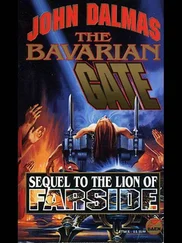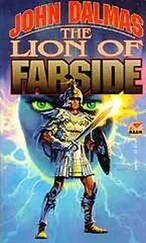John Dalmas - The Yngling
Здесь есть возможность читать онлайн «John Dalmas - The Yngling» весь текст электронной книги совершенно бесплатно (целиком полную версию без сокращений). В некоторых случаях можно слушать аудио, скачать через торрент в формате fb2 и присутствует краткое содержание. Жанр: Фэнтези, на английском языке. Описание произведения, (предисловие) а так же отзывы посетителей доступны на портале библиотеки ЛибКат.
- Название:The Yngling
- Автор:
- Жанр:
- Год:неизвестен
- ISBN:нет данных
- Рейтинг книги:5 / 5. Голосов: 1
-
Избранное:Добавить в избранное
- Отзывы:
-
Ваша оценка:
- 100
- 1
- 2
- 3
- 4
- 5
The Yngling: краткое содержание, описание и аннотация
Предлагаем к чтению аннотацию, описание, краткое содержание или предисловие (зависит от того, что написал сам автор книги «The Yngling»). Если вы не нашли необходимую информацию о книге — напишите в комментариях, мы постараемся отыскать её.
The Yngling — читать онлайн бесплатно полную книгу (весь текст) целиком
Ниже представлен текст книги, разбитый по страницам. Система сохранения места последней прочитанной страницы, позволяет с удобством читать онлайн бесплатно книгу «The Yngling», без необходимости каждый раз заново искать на чём Вы остановились. Поставьте закладку, и сможете в любой момент перейти на страницу, на которой закончили чтение.
Интервал:
Закладка:
Imre and Nils poked cautiously about in one building whose lower levels still stood, and wondered whether it could ever have housed men.
There were no stoves or fireplaces, or anything to take away smoke, or anything to see except debris. "I like it better outside than in here," Nils commented.
"You're right. Let's go back out. Anyway, there's only one building I really want to see. I've looked at it from a distance through the palace windows and the whole immense thing seems still to be standing. It may be farther than we have time to go, though, and maybe we wouldn't be able to find it in this wilderness anyway."
They mounted and went farther on among the trees. "Do you mean the building with the huge dome?" Nils asked.
"That's the one. It is said to be a church."
"And what is, or was, a church?" Nils wanted to know.
"Well," explained Imre, "in the olden times men believed in imaginary beings who were thought to be very powerful and therefore had to be given gifts and sung to, and in general the people had to debase themselves before them. Even the nobility; even kings. And great palaces called churches were built and dedicated to the chief of those beings, who was called Christianity."
"I'm surprised I never heard of him before," Nils said.
"It is said that belief in him died out before the Great Death. Perhaps in your land even the memory was lost, or perhaps it never existed there."
They were passing the base of a great hill of rubble upon which stood only scattered shrubs and scrubby trees, but numerous stalks of forbs lay broken, suggesting that in season it would be alive with wild flowers. Turning their horses, they rode toward its top, hoping to get a better directional fix from its elevation.
"I've heard," Nils remarked, "that some Magyars now believe in a supernatural being called Baalzebub. Have any churches been built to him?"
"There can't be churches to Baalzebub. It's against the law to follow that cult."
"But wasn't it the elder king who decreed that? There is a rumor that Janos III tolerates it."
"It's a lie," Imre said decisively. "For my lord has told me that the cult of Baalzebub is vile and that if I ever have anything to do with it, I will be exiled." He paused and looked upward. "I guess our sunshine is gone, and this rising wind is cold. Do you want to go on or shall we go back to Pest?"
"Let's go back," Nils answered, and they rode briskly down the slope into the trees.
"Nils, why did you ask about Baalzebub?"
"Not through any wish to offend you, I promise you that."
"I believe you," Imre said. "But let me explain something that may make things clearer to you. There are those who dislike our lord because he is not the strong and open man his father was, and they pass evil rumors about him. But I've known him since I was a little boy, almost as long as I can remember, and he has been a second father to me. I know his faults, but I also know he is a good man."
"Did he take you with him on his trip to the lower Duna?"
"No. He took none of his household except for five guards. I was only ten then. And he went only as far as the Serbland, not the lower Duna."
"Was it from there he brought his dark-skinned counselor?"
"Dark-skinned counselor?"
"The one named Ahmed."
Imre looked strangely at Nils for a moment, before his frown dissolved into a smile. "Oh, I see. Ahmed is not a counselor, Nils; he is only a personal servant."
"Ah. He is so secretive and his appearance so sinister, I thought he might be a servant of Baalzebub, given to the king to influence him without the king knowing it."
Imre laughed. "Civilization must seem strange to someone from the wild north. No, Nils, Ahmed is not secretive, only shy. And as for sinister, others feel the same about that as you do. But it is only his blackness, for which he can thank a scorching eastern sun."
A strong gust of wind rattled the bare branches above them. "Look, snowflakes!" Nils said. In a few moments the air was swirling with them, and Nils and Imre spurred their horses to a trot, where trails permitted, until they came out of the forest. Then, faces glowing from exhilaration and wet snow, they galloped down the road to Pest.
And from that time Nils was prepared for a trip down the Duna, possibly in chains, unless of course, he was murdered. For Ahmed would certainly read Imre, and Kazi would either want to examine this barbarian psi himself or have him dead.
Within weeks the message came to Janos by a courier in livery richer than the people of Pest had even seen, along with a troop of tall, swarthy horsemen on animals that awed even the great Magyar horse breeders. Kazi sent it this way instead of through Ahmed in order to keep the psi tuner secret from Janos.
"Ahmed," Janos said, "I won't stand for it. Why does he want me to send the boy to him?"
Ahmed looked thoughtfully at the soft bleached parchment as if he hadn't already known what would be written there or why. "Perhaps he doesn't trust you."
"But that's nonsense. Why shouldn't he trust me? I've done nothing to earn his distrust."
"I don't know that he distrusts you, but that would explain his request. Remember, you are hundreds of kilometers away from him, and so he has no way of looking into your mind. He is used to knowing the minds of everyone around him, and is impatient when he doesn't."
"So he wants the boy as a hostage, then," Janos snapped. "He can't have him."
"Why not?" Ahmed asked. "You know he'll treat him like a prince, for he depends on you, and youth enjoys the adventure of strange lands. You could send the giant barbarian with him as bodyguard and companion, for they are close friends."
Janos sat quietly for a few minutes, his face still angry at first, then gradually grim, and finally thoughtful. "All right," he said at last. "I'll do it. Imre and the barbarian on my royal barge, and a detail from my guard. I will also provide a barge for the courier troop and they can leave their horses with me as a gift." He looked at Ahmed, thin-lipped. "But I do not like this hostage business, for I gave him my word and I am not used to being treated like this."
12.
While a man was chief of the Svear, his home village would be known as Hovdingeby, the Chief's Village. During the chieftainship of Axel Stornave, Hovdingeby was in perhaps the greatest farm clearing in Svealann, called Kornmark for the barley that once was grown there. Now barley could not be relied on to mature its grain, and it was rye that filled the bins after harvest.
Kornmark covered a somewhat irregular area of about two by five kilometers, broken here and there by birch groves, swales, and heaps of stones that had been picked from the fields. There were three villages in Kornmark, one near each end and one near the center, each covering a few hectares. Each was a rough broken circle of log buildings-the homes, barns and outbuildings of the farmers-surrounding a common ground. In the middle of the common was the longhouse, which contained a feasting hall, guest lodgings, and the communal steam bath.
It was late May, when the daylight lasts for more than eighteen hours. Normally in that season cattle would have been in the fields, fattening on new grass, and the air would have been pungent with smoke as the boys and women burned off last year's dead grass in the surrounding pasture woods. But this year the fields were still soft brown mud, while along the leeward sides of the stone fences there still lay broad, low drifts of granular snow.
A thin, cold rain drove out of the west against the backs of two warriors who were walking across the clearing on the cart road. Their leather breeches were dark with rain, and the fur of their jackets was wet and draggled. In the forest, where spruce and pine shaded the trails, they had run on skis. Now each carried his skis on one wide shoulder, with his boots slung over the other, and the deep tracks of their tough bare feet filled at once with icy water.
Читать дальшеИнтервал:
Закладка:
Похожие книги на «The Yngling»
Представляем Вашему вниманию похожие книги на «The Yngling» списком для выбора. Мы отобрали схожую по названию и смыслу литературу в надежде предоставить читателям больше вариантов отыскать новые, интересные, ещё непрочитанные произведения.
Обсуждение, отзывы о книге «The Yngling» и просто собственные мнения читателей. Оставьте ваши комментарии, напишите, что Вы думаете о произведении, его смысле или главных героях. Укажите что конкретно понравилось, а что нет, и почему Вы так считаете.








